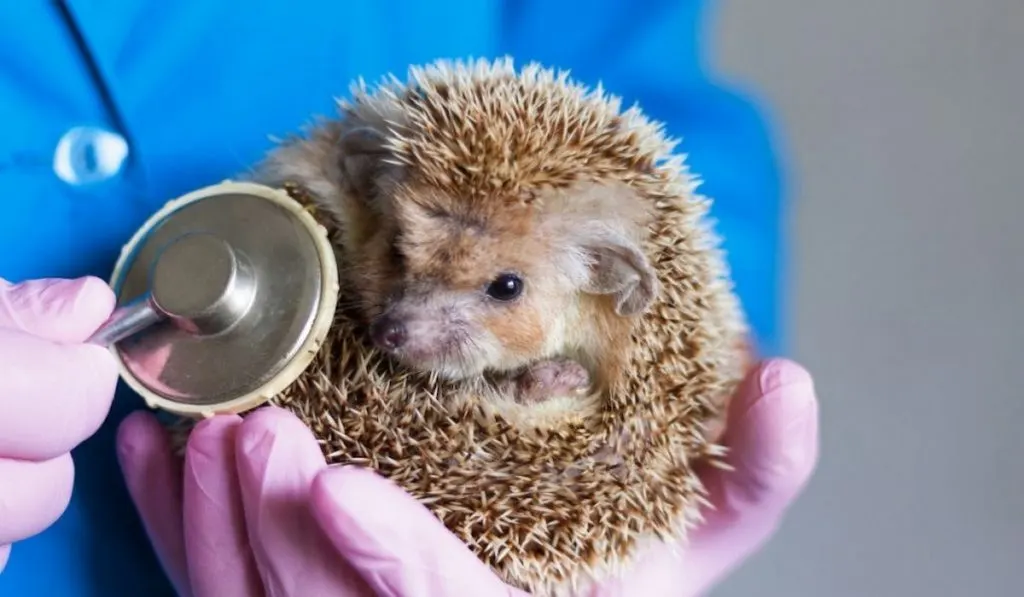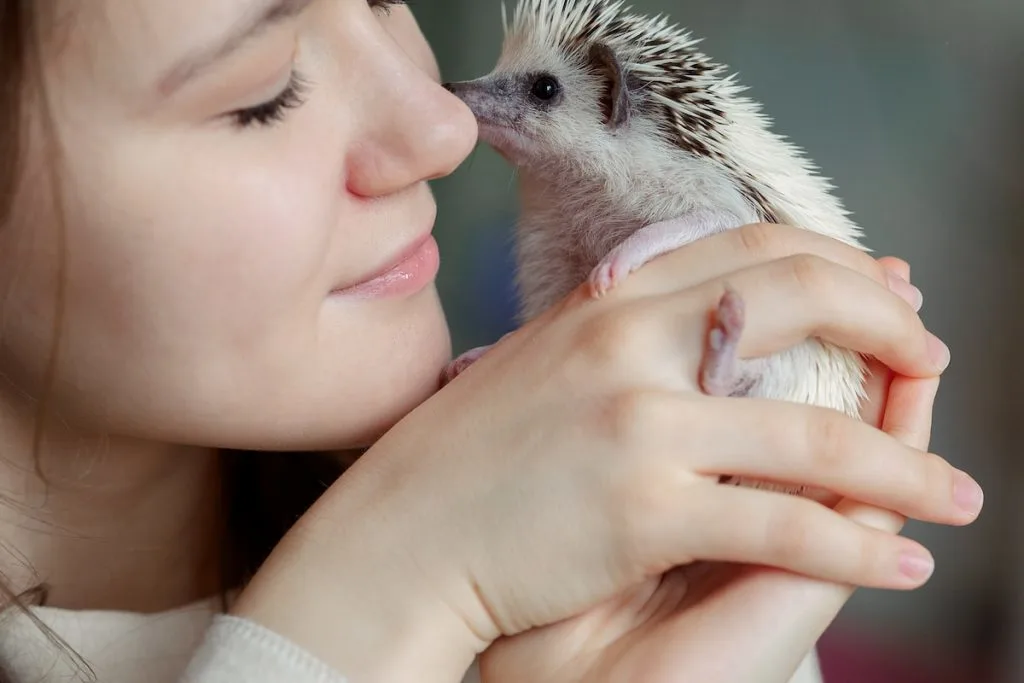Introduction
Do hedgehogs need shots like our other pets? No, shots are not necessary for hedgehogs.
Unlike cats and dogs, hedgehogs are not known to be natural carriers of viruses and diseases like distemper and rabies that need vaccination. They may, however, experience a wide variety of medical problems that need the intervention of a vet.

Having your vet perform regular checks on your hedgehogs helps in the early diagnosis of serious medical issues that your pet may be having. Then your vet can suggest solutions or strategize ways to curb the illness.
Besides regular visits to the vet, you, as an owner, should keep an eye on your pet to watch out for any signs of illnesses or sudden changes in your hedgehog’s behavior. When in doubt, it is always advisable to contact your vet for advice.
Hedgehogs that play outdoors often interact and eat insects in the wild. This group often needs to be treated for parasites such as mites. Your vet should be able to outline a plan for prevention and treatment, just in case the hedgehog is exposed to such risks again.
Most hedgehogs are treated for mites at least once in their lifetime.
They are mainly found in food and bedding and can be transferred from other animals that the hedgehog interacts with. Most mites may live in your hedgehog undetected until another stressor weakens the hedgehog’s immunity, then the mites explode as a secondary problem.
Are Vet Visits Necessary for Hedgehogs?
Yes, vet visits are as necessary as any other pet’s visit(s) to their vets. Remember that it is a bad decision to self-diagnose and make assumptions when you see symptoms of discomfort or illness.
It is therefore recommended to have a vet doing routine checks on your hedgehog, to let them (the vet and the hedgehog) interact and create a nice relationship for both you (the owner), and the hedgehog to trust the doctor before any tight situation arises.
Besides regular health checks, neutering and spaying should be done, and fecal tests to assess the pet’s health. Older hedgehogs are more prone to infections and should visit a vet more frequently.
Let’s take a look at some hedgehog problems that might require the vet’s attention.

Cancer
Cancer is common in hedgehogs, with tumors growing on most body organs, but especially found in the mouth and the digestive tract. Signs are often negligible since they are non-specific. They may include weight loss, lethargy, and loss of appetite.
Surgical removal may be applied to remedy this, although they may not be successful because most cases are diagnosed when the cancer is at an advanced stage.
Obesity
Imbalanced or inappropriate diets often lead to malnutrition and obesity. It is therefore good to give them the right and required amounts of food to avoid obesity.
A clear sign of obesity for a hedgehog is that the feet, face, and ears are still visible when it curls up. A normal hedgehog would be totally covered by its spines when it curls up.
Dental disease
Periodontal disease, tartar, gingivitis, and oral tumors are common for hedgehogs. Seeing a vet will allow a thorough oral examination, dental cleaning, x-rays, and extractions as required.
The signs for dental disorders are halitosis, pawing at the mouth, visible blood around the mouth, and not a loss of appetite, but that they are just not eating.
Eye problems
Hedgehogs are prone to corneal ulcers and eye injuries. It is good to see a vet for diagnosis and for proper and effective treatment.
This can, at times, be difficult as the hedgehogs ball up and hide their faces making it hard to diagnose their eyes.
Hedgehogs are, however, known to have strong senses of smell and hearing, which enable the blind ones to get along just fine, and they adapt to their environment.
Oral foreign objects
Hedgehogs may at times get excited to chew large chunks like carrot pieces or peanut halves, which may get lodged at the teeth or in the roof of the mouth.
An anesthetic is needed to stabilize the pet and diagnose the problem and remove the foreign objects if there are any. Common signs of this problem are decreased appetite, anorexia, and pawing at the mouth.
Among other problems that may push a hedgehog to see a vet includes severe foot necrosis, vitamin deficiencies, pneumonia, mites, fatty liver disease, internal parasites, and gastrointestinal disease.
Regular health check visits to your vet promote healthy and well-informed living for your hedgehog. It is always good to consult with your vet in case of any inquiries.
How Often to Visit The Vet
Most opinion makers recommend an annual visit. This can, however, prove to be an inadequate solution since it is difficult to diagnose growing medical trouble, but with regular visits to the vet, diagnosis is possible.
Small animals like hedgehogs instinctively do not show any signs of weaknesses or illness, to avoid being easy prey. Modern medicine however proves so important in unveiling what is not indicated by the little pet.

Selecting Your Hedgehog
When purchasing a hedgehog, avoid those that look listless, appear ill, and are too quiet. Healthy hedgehogs should be quick and alert.
Those with discharge from the eyes and the nose, including those with closed eyes should also be avoided, as they are mostly reactive and feel threatened, making them ball up difficult to inspect.
Red ears or ears with excess wax are signs of infections. Their skin should also be free of any kind of scaliness.
When purchasing, also check the anal area for moisture or diarrhea, which may be a sign of gastrointestinal infections. If possible, it is also good to check the mouth for any inflamed or red gums, and any broken teeth.
Hedgehogs are usually purchased at exotic pet shows, pet shops, and through direct contact with breeders.
How to Pick a Vet Perfect for Your Hedgehog
There are vets who specialize in hedgehog care. Also, not all vets will accept hedgehogs as clients. It is important to find a vet who is experienced with hedgehogs, so as to get informed advice and pre-informed answers to questions relating to the hedgehog’s health.
The task of finding the best vet for your hedgehog should not only focus on the qualification of the vet but also their availability around the clock and policies that enhance customer relations.
It is often a difficult task to find professional vets who can handle exotic animals. Google and other search engines are helpful in identifying the vets near you.
You can also get recommendations from other vets, who often recommend colleagues with a better understanding and who can provide better solutions for hedgehog problems.

Examination Difficulties
Most hedgehogs require sedation in form of anesthesia, even for a simple examination because they curl up whenever they are handled. It is understandable that it is a defense mechanism, but it makes it difficult if not impossible for your vet to examine the pet.
Gas anesthetics like isoflurane are often used since they are safe and guarantee safety for examination for both the pet and the doctor. There is always a risk with anesthesia, but death is a much more costly risk if proper diagnosis and examination are not conducted on the hedgehog.
Conclusion
Hedgehogs do not need shots, but rather need regular check-ups and veterinary care to point out and distinguish signs of illnesses at early stages. Finding a specific vet best for your hedgehog builds a good relationship for both the doctor and the pet.
When finding vets, referrals from other vets are always the best. Spaying and neutering are recommended if you keep many hedgehogs in close habitats or cages.
Most problems facing hedgehogs that may require the vet’s attention are obesity, mites, cancer, and dental issues. A caring owner should also be always on the lookout for changes in habits and appearance in their hedgehogs.
Resources
- http://hedgehogkeeper.com/do-hedgehogs-need-shots-and-regular-veterinary-care/
- http://www.hedgehogheadquarters.com/secure/vetcare.htm
- https://vcahospitals.com/know-your-pet/hedgehogs—owning
- https://www.texvetpets.org/article/hedgehogs/
- https://vcahospitals.com/know-your-pet/hedgehogs-problems
- https://www.thesprucepets.com/pet-hedgehogs-1239052
